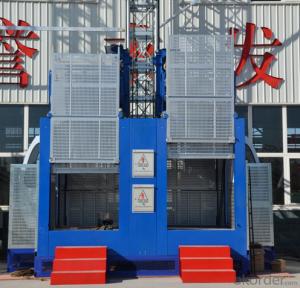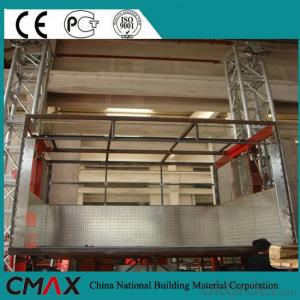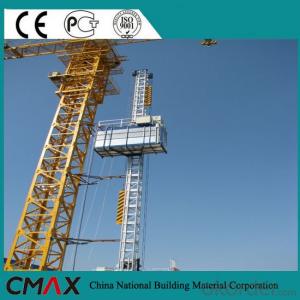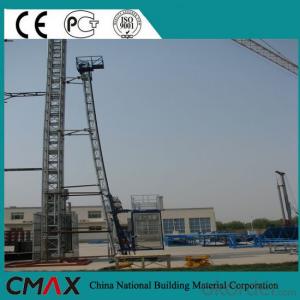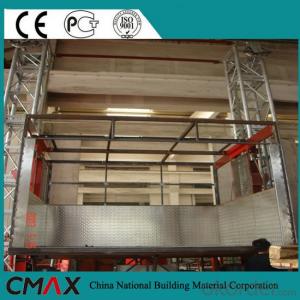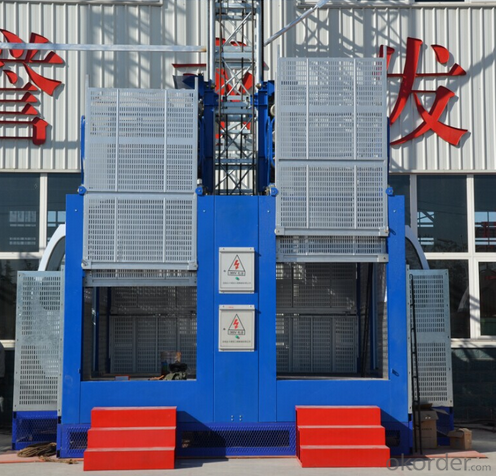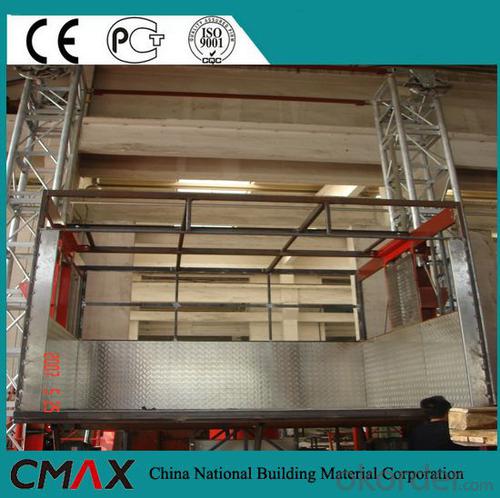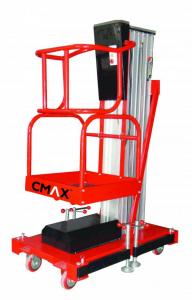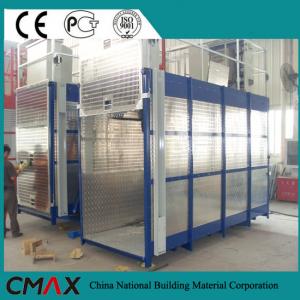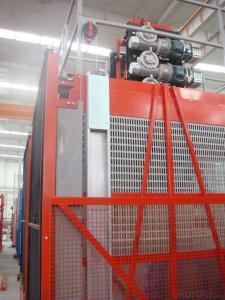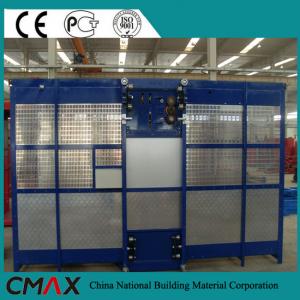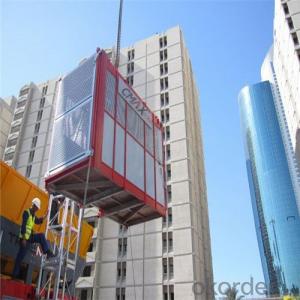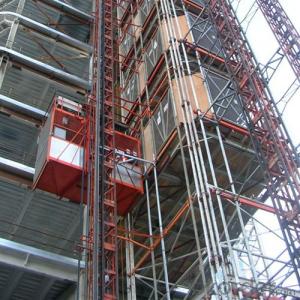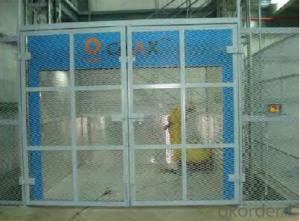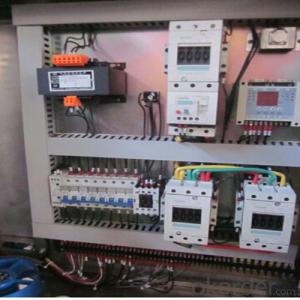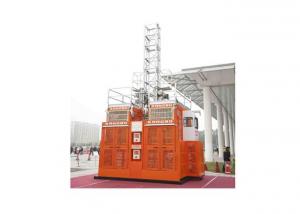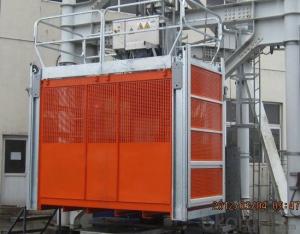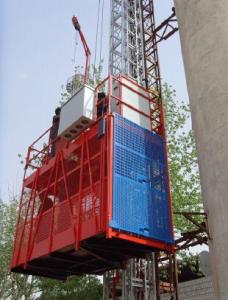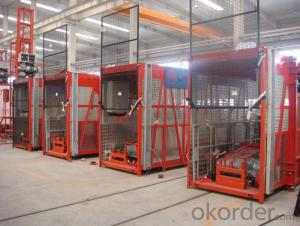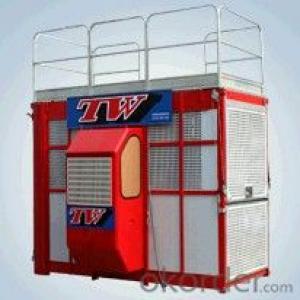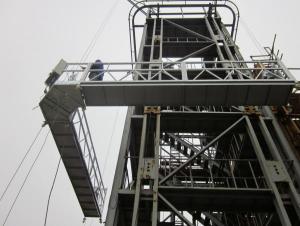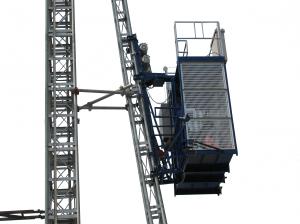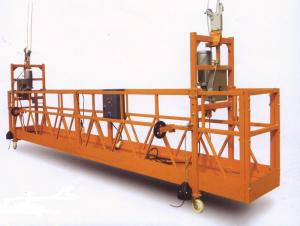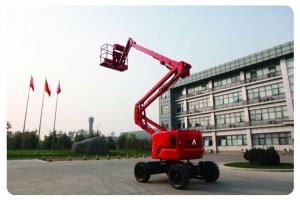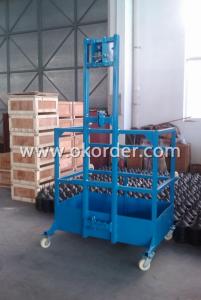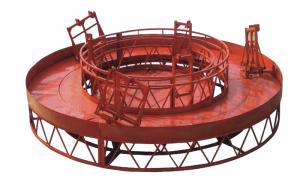Construction Hoist with Mast Section and Rack for Building /Chimney/Bridge
- Loading Port:
- China main port
- Payment Terms:
- TT OR LC
- Min Order Qty:
- 1 set
- Supply Capability:
- 1000 set/month
OKorder Service Pledge
OKorder Financial Service
You Might Also Like
Structure of Building Hoist
Condition: New
Place of Origin: China (Mainland)
Model Number: SC100/100Z
Usage: Construction Hoist
Power Source: Electric
Sling Type: Cable
Maximum Lifting Weight: 1000kg*2
Maximum Lifting Height: 250m
Lift Speed: 0--55m/min
Certification: ISO9000,CE,GOST, Korea Standard
Warranty: 1 year
After-sales Service Provided: Engineers available to service machinery overseas
Type: SC100/100Z construction building lifting equipment
Cage: Double cage
Rated capacity: 1000kg per cage (1000kg*2)
Lifting speed: 0--55m/min
Voltage-frequency: 380-50HZ( can be arranged to client's requirement)
Motor Power: 3*15kw per cage (3*15kw*2)
Certification: ISO9000,CE,GOST, Korea Standard
Mast section: 650*650*1508(mm) weight:145Kg
Drive type: Gear and rack
Surface treatment: Blasting,Baking finished ,galvanize,Painting
Packaging & Delivery
Packaging Details:40HQ Container in nude
Delivery Detail:Within 7 days after confirming the order
Building hoist Specifiction
The newly designed computer controlled auto landing equipment, wireless floor call system and the overload alarming caller can be chosed by customers. The above three functions can be used alone or together according to the requirement of customers. The computer controlled auto landing equipment, wireless floor call and the overload alarming caller can be one computer controlling panel to realize the automatic operating.
| Model(single and double cage) | Capacity(kgs) | Lifting speed(m/min) | Motor power(kw) |
| SC100TD | 1000 | 36 | 2x11 |
| SC200TD | 2000 | 36 | 3x11 |
| SC270TD | 2700 | 36 | 3x15 |
| SC320TD | 3200 | 36 | 3x18.5 |
| SC100/100TD | 2x1000 | 36 | 2x2x11 |
| SC200/200TD | 2x2000 | 36 | 2x3x11 |
| SC270/270TD | 2x2700 | 36 | 2x3x15 |
| SC320/320TD | 2x3200 | 36 | 2x3x18.5 |
| SC100GZ | 1000 | 0-63 | 2x15 |
| SC200GZ | 2000 | 0-63 | 3x18.5 |
| SC270GZ | 2700 | 0-63 | 3x22 |
| SC200/200GZ | 2x2000 | 0-63 | 2x3x15 |
| SC270/270GZ | 2x2700 | 0-63 | 2x3x18.5 |
| SC320/320GZ | 2x3200 | 0-63 | 2x3x22 |
| SC100/100G | 2x1000 | 0-96 | 2x2x22 |
| SC200/200G | 2x2000 | 0-96 | 2x2x22 |
| SC270/270G | 2x2700 | 0-96 | 2x2x22 |
Building Hoist Images
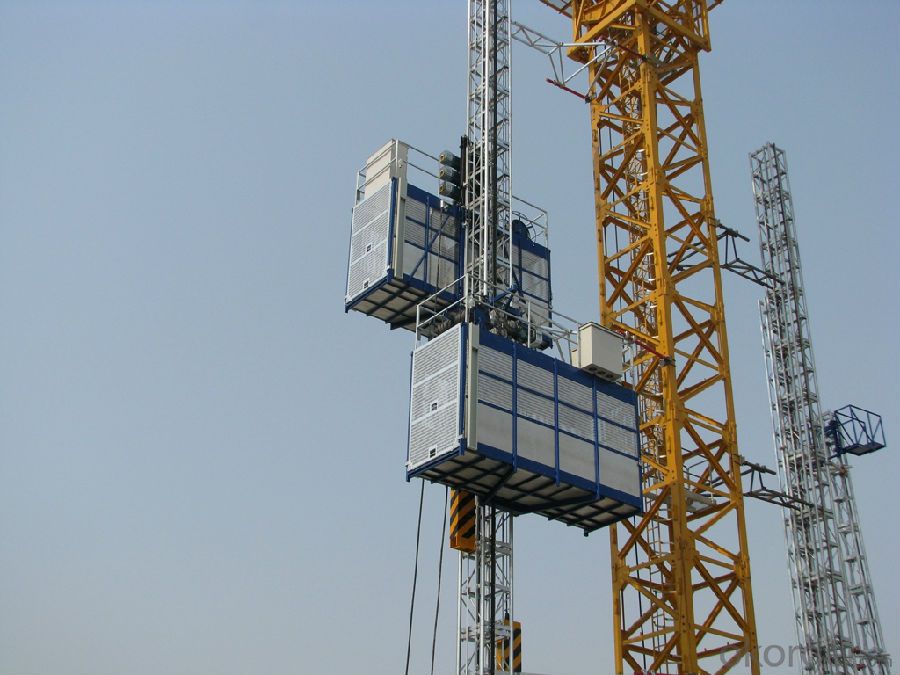
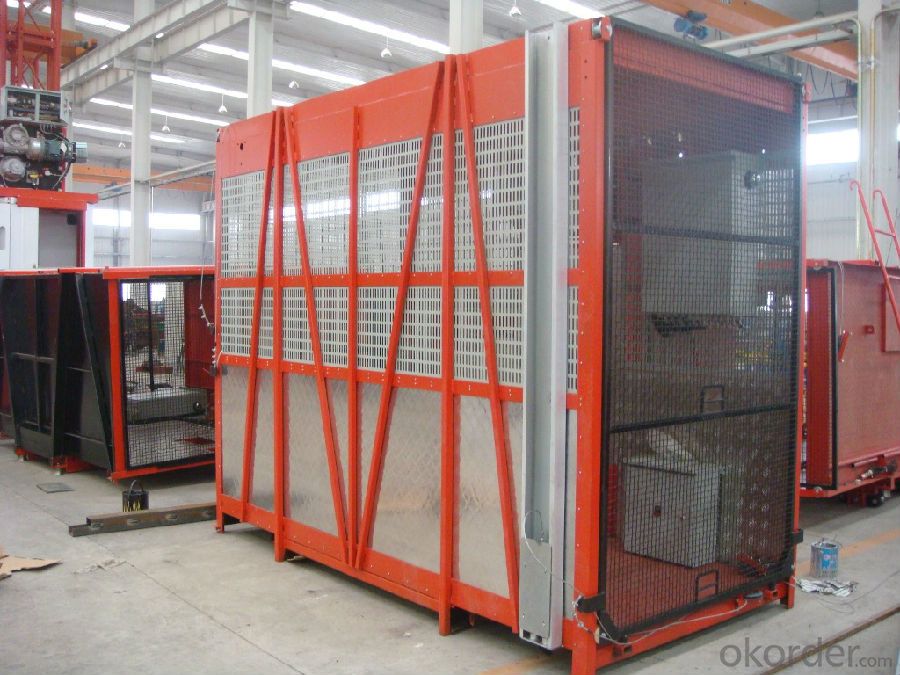
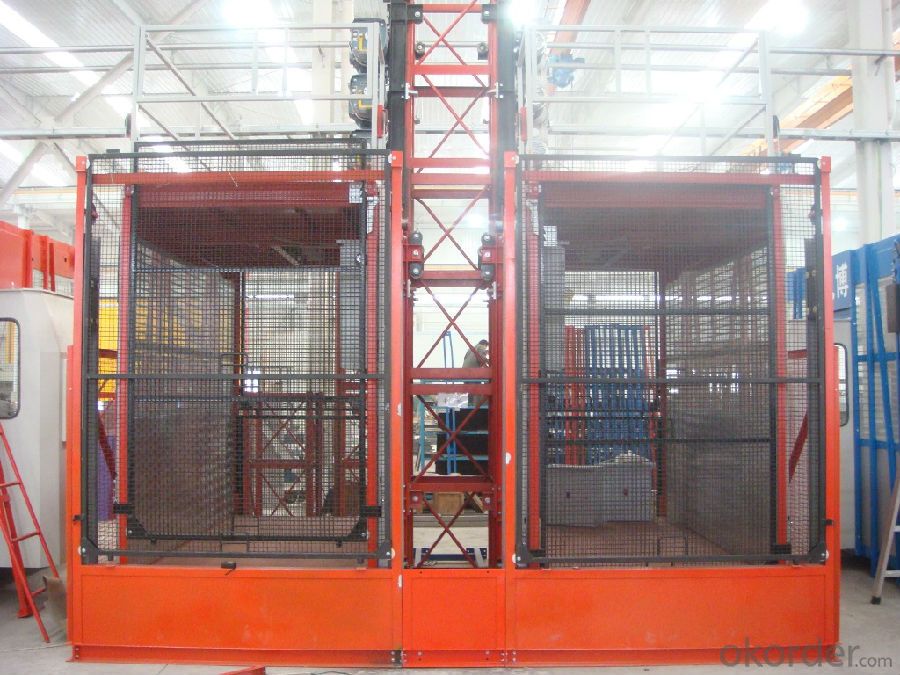
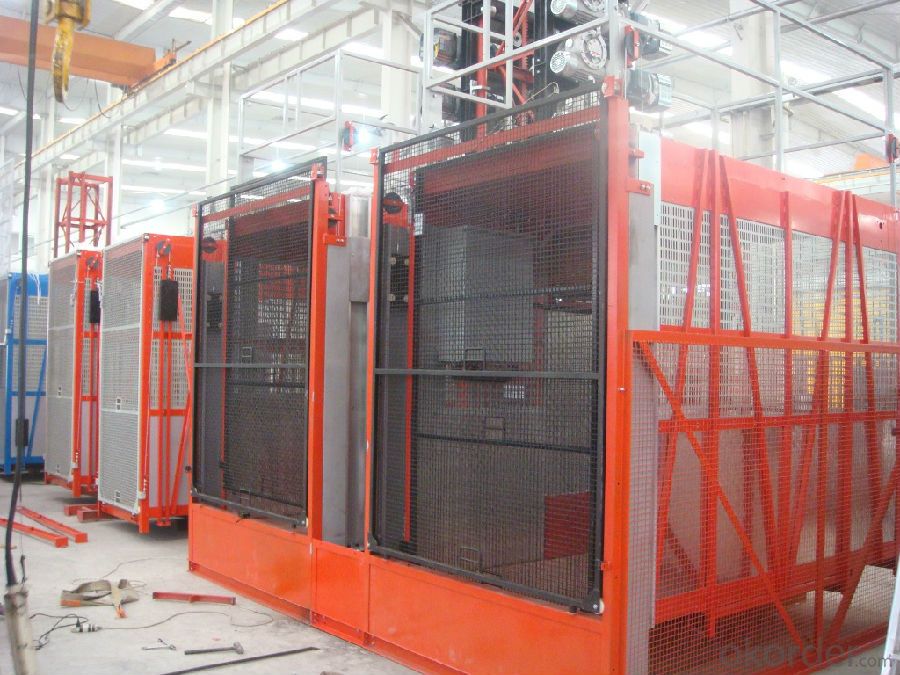
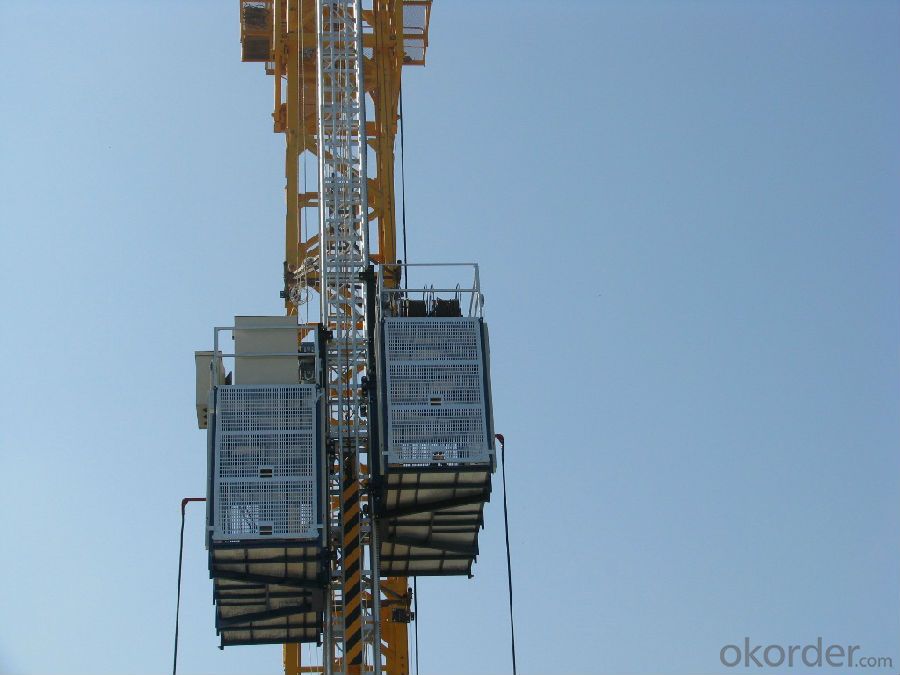
FAQ of Building Hoist
Q: What is the building hoist main purpose?
A: Building hoist equipped with double or single cabin to transport the materials and labors up and down. It's the ideal
construction equipment for vertical transportation in the field of construction.
Q: What is the main structure of building hoist?
A: The P/M construction hoist mainly contains metal structure, driving system, electrical control system, cable guide &
protection system, electrical top crane and safety device.
Q: What is the meaning of the building hoist’s code?
A: Take SC200/200 for example: “SC” stands for rack and pinion hoist, “200/200” stands for double cage and capacity
is 2 tons per cage. “SC200” stands for single cage and capacity is 2 tons.
Q: What is the dimension of the cage?
A: Normally the cage dimension is 3X1.5X2.5M (L/W/H) for 2t type hoist. Details should be checked according to our
quotation sheet. Also, the size can be customized according to the factual site condition. There are two doors (entrance
& exit doors) for each cage, It can be produced as up & down sliding or ramping model for safety and convenience
- Q: Is it possible to use a building hoist for lifting delicate or fragile items?
- <p>A building hoist is typically designed for heavy construction materials and not recommended for lifting fragile objects. The vibrations and force exerted during lifting can damage delicate items. For fragile objects, specialized hoists or cranes with controlled movements and gentle handling capabilities are advised to ensure safety and prevent damage.</p>
- Q: Is it possible to substitute an automatic lifting device with a manual one in construction projects?
- <p>While it is technically possible to use a manual lifting device in place of an automatic one for certain construction tasks, it is not generally recommended. Manual lifting devices are typically less efficient, slower, and can pose safety risks due to the physical effort required. They may also not meet the load-bearing requirements of heavy construction materials. Automatic lifting devices are designed for efficiency, safety, and to handle heavy loads, making them more suitable for construction work. It's crucial to adhere to safety standards and use appropriate equipment for the task at hand.</p>
- Q: Can construction elevators be taken by people or by goods
- The construction elevator can be taken either by person or by cargo Material hoist (dragon door frame, well frame) can be carried only, not by person
- Q: Explain how a lifting platform, specifically a building hoist, operates.
- <p>A building hoist, also known as a construction hoist, is a temporary lifting platform used in construction to lift materials and personnel vertically within a building under construction. It operates by using a motor-driven pulley system that runs on guide rails or tracks. The hoist is attached to the building structure and as the building grows, the hoist is extended upwards. The platform is loaded with materials or workers, and the operator controls the ascent or descent through an electrical switch or remote control. Safety features include limit switches to prevent over-travel, safety catches to stop the platform in case of a cable failure, and interlocks to ensure the platform cannot be operated when the doors are open.</p>
- Q: Is it possible to utilize a building hoist for the purpose of lifting heavy objects or construction materials?
- <p>Yes, a building hoist is specifically designed for lifting large objects and materials in construction settings. These hoists are engineered to handle heavy loads, making them ideal for transporting construction materials, equipment, and other heavy items vertically within a building. They are equipped with safety features and are regulated to ensure they can bear the weight and pressure of the materials being lifted, thus playing a crucial role in the construction process.</p>
- Q: This question asks for the proper steps to install a building hoist, a device used in construction to lift materials and workers.
- <p>To install a building hoist correctly, follow these steps: 1) Ensure the site is suitable and inspect the hoist for any damages. 2) Assemble the hoist tower on a solid, level base. 3) Install the mast and guide rails according to the manufacturer's instructions. 4) Attach the hoist mechanism and cab, ensuring all connections are secure. 5) Conduct a thorough inspection and test the hoist's functionality. 6) Obtain necessary permits and inspections from local authorities. 7) Train operators on the safe use of the hoist. Always adhere to safety guidelines and manufacturer's specifications.</p>
- Q: This question asks for the steps or methods to fix a building hoist that is not working properly.
- <p>To repair a malfunctioning building hoist, first, ensure the hoist is powered off and disconnected from any power source to ensure safety. Inspect the hoist for visible damage or loose parts. Check the motor, cables, and control panel for any signs of wear or damage. If the issue is mechanical, such as a stuck cable or a jammed pulley, disassemble the affected parts and clean or replace them as necessary. For electrical issues, inspect the wiring and connections for any shorts or breaks. Consult the hoist's manual for troubleshooting guides specific to the model. If the problem persists or if you're unsure about any steps, it's best to contact a professional technician for repair to avoid further damage or safety hazards.</p>
- Q: This question asks for an explanation of the functioning of hydraulic cylinders in lifting equipment.
- <p>Hydraulic cylinders in lifting equipment operate by converting hydraulic pressure into linear mechanical motion. They consist of a cylinder barrel, a piston, and a piston rod. When pressurized fluid is introduced into the cylinder, it pushes the piston, which in turn moves the piston rod. This movement is what lifts or moves the load. The force exerted by the piston is proportional to the pressure of the fluid and the area of the piston. The cylinder's design allows for controlled and precise lifting, making it ideal for heavy-duty applications where power and control are required.</p>
- Q: Is it possible for a hydraulic cylinder in a building hoist to be serviced or replaced by individuals other than the manufacturer?
- <p>Yes, a hydraulic cylinder in a building hoist can be repaired or replaced by qualified individuals or companies other than the manufacturer. However, it is crucial to ensure that the service provider has the necessary expertise and follows the manufacturer's specifications to maintain safety and performance standards. Using non-genuine parts or improper installation can lead to safety hazards and void warranties. It is always recommended to consult with professionals who are familiar with the specific hoist model and have experience in hydraulic systems repair and maintenance.</p>
- Q: Is it possible to utilize building hoists for the transportation of materials and equipment within construction sites?
- <p>Yes, building hoists are commonly used in construction sites to move materials and equipment. They are designed to lift and lower heavy loads vertically, making them ideal for transporting construction materials, tools, and equipment between different floors or levels of a building under construction. This equipment significantly enhances efficiency and safety on construction sites by reducing manual labor and the risk of accidents associated with manual handling of heavy items.</p>
Send your message to us
Construction Hoist with Mast Section and Rack for Building /Chimney/Bridge
- Loading Port:
- China main port
- Payment Terms:
- TT OR LC
- Min Order Qty:
- 1 set
- Supply Capability:
- 1000 set/month
OKorder Service Pledge
OKorder Financial Service
Similar products
Hot products
Hot Searches
Related keywords
